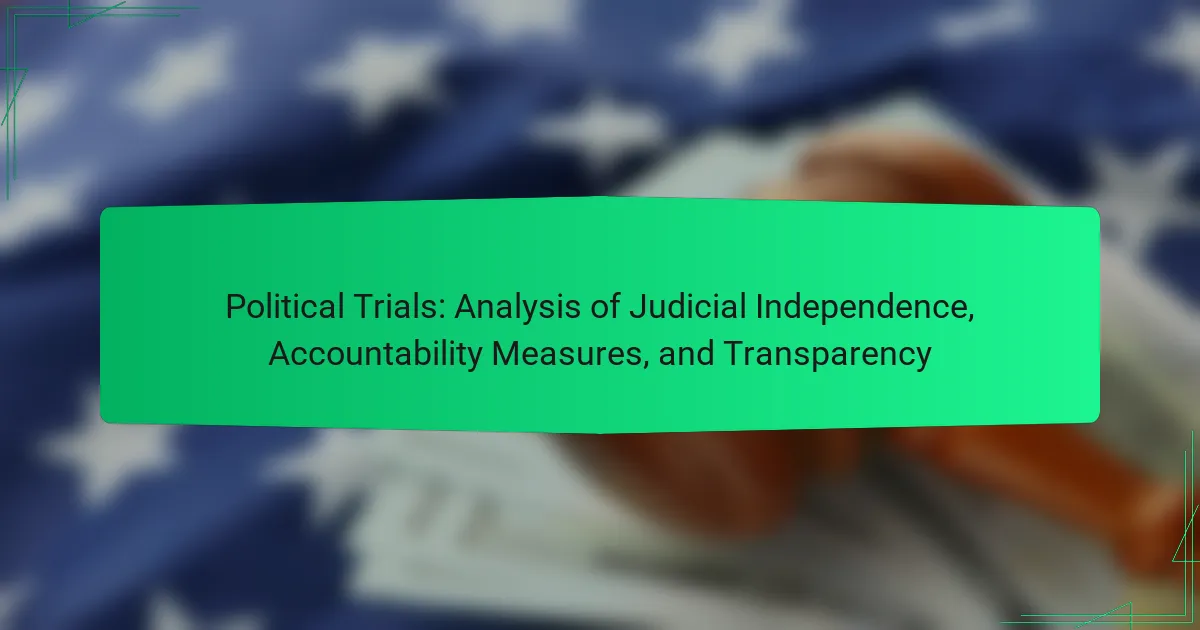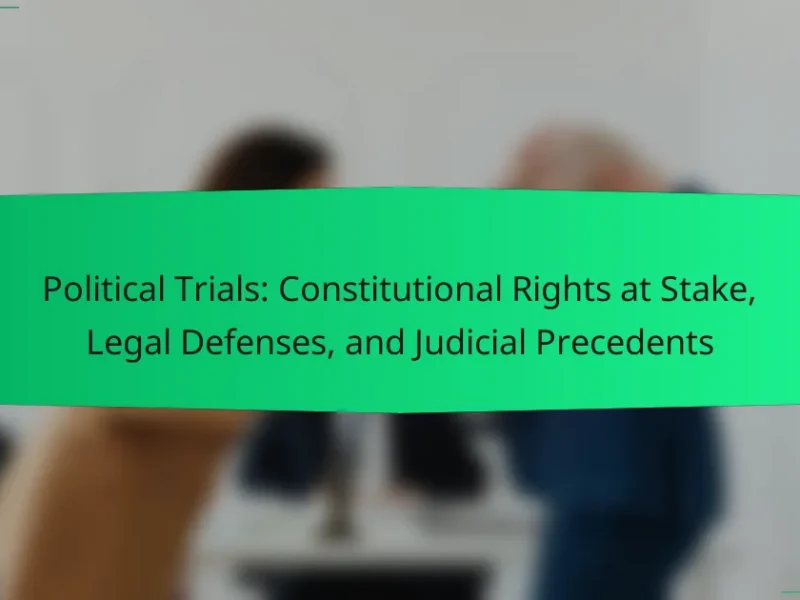Political trials are judicial proceedings involving political figures or issues, often related to allegations of misconduct or crimes. These trials are critical for holding leaders accountable and shaping the political landscape, as seen in historical cases like the Nuremberg Trials. However, they face challenges such as political pressure, threats to judicial independence, and issues of fairness, which can compromise the integrity of the judicial system. Transparency in these trials is essential to ensure justice and maintain public trust, as it allows for scrutiny and accountability within the legal process. This article analyzes the significance of judicial independence, accountability measures, and the role of transparency in political trials.

What are Political Trials and their Significance?
Political trials are judicial proceedings that involve political figures or issues, often addressing allegations of misconduct or crimes. These trials can serve to hold leaders accountable for their actions. They also play a crucial role in the political landscape of a country. For example, the Nuremberg Trials after World War II aimed to prosecute war crimes and establish accountability. Political trials can influence public perception and trust in the judicial system. They may also impact the stability of governments and political regimes. In some cases, political trials are criticized for lacking fairness or being politically motivated. The significance of these trials lies in their potential to uphold the rule of law and promote justice in society.
How do Political Trials differ from regular trials?
Political trials differ from regular trials primarily due to their political context and implications. Political trials often involve government officials or politically charged cases. They may lack impartiality, as the judiciary can be influenced by political pressures. In contrast, regular trials typically adhere to established legal standards and principles. Political trials can also feature expedited procedures that prioritize political expediency over due process. Historical examples include the Nuremberg Trials, which were driven by political motives rather than solely legal ones. Regular trials focus on individual rights and legal accountability, while political trials often serve broader political agendas.
What are the defining characteristics of Political Trials?
Political trials are judicial proceedings that involve political figures or issues. They often arise in contexts of political conflict or regime change. These trials frequently lack impartiality and can be influenced by political motives. The accused may face charges that are politically motivated rather than based on legal violations. Political trials often attract significant media attention and public scrutiny. They can serve as tools for governments to suppress dissent or consolidate power. Historical examples include the trials of political leaders during revolutions or authoritarian regimes. The outcomes of such trials can have lasting impacts on political landscapes.
Why are Political Trials important in a democratic society?
Political trials are important in a democratic society because they uphold accountability and transparency. They serve as a mechanism to check the power of political leaders. By holding officials accountable for misconduct, political trials reinforce the rule of law. Historical examples, such as the impeachment trials in the United States, illustrate this function. These trials provide a platform for public scrutiny of government actions. They also promote civic engagement by involving citizens in the democratic process. Furthermore, political trials can deter future abuses of power. Overall, they are essential for maintaining trust in democratic institutions.
What role does Judicial Independence play in Political Trials?
Judicial independence is crucial in political trials as it ensures impartiality and fairness. It allows judges to make decisions free from external pressures or influences. This independence protects the rule of law and upholds democratic principles. In political trials, where the stakes are often high, an independent judiciary can prevent abuses of power. Historical examples, such as the Nuremberg Trials, illustrate the importance of judicial independence in maintaining justice. When judges are free to act without fear of retaliation, they can uphold the rights of defendants. This fosters public trust in the legal system and promotes accountability. Ultimately, judicial independence is essential for the integrity of political trials.
How is Judicial Independence defined in the context of Political Trials?
Judicial independence in the context of political trials is the principle that judges must make decisions free from external pressures. This independence is crucial for ensuring fair and impartial trials, especially when political interests are involved. It allows the judiciary to uphold the rule of law without influence from the government or other entities. Historical examples, such as the trials during the Nuremberg proceedings, illustrate the importance of judicial independence in maintaining justice. The United Nations emphasizes that an independent judiciary is essential for the protection of human rights and democratic governance.
What factors influence Judicial Independence in these trials?
Judicial independence in political trials is influenced by several key factors. These factors include the legal framework governing the judiciary, the political environment, and the presence of external pressures. A strong legal framework ensures judges can make decisions free from political interference. The political environment can either support or undermine judicial independence, particularly during politically charged cases. External pressures may arise from government entities, public opinion, or interest groups seeking to influence judicial outcomes. Historical instances, such as cases in authoritarian regimes, demonstrate how these factors can severely limit judicial autonomy.
How do Accountability Measures affect Political Trials?
Accountability measures significantly influence political trials by ensuring transparency and adherence to legal standards. These measures promote judicial independence, allowing courts to operate without external pressures. When accountability is enforced, it can lead to fairer trial outcomes. For example, countries with robust accountability frameworks often report higher public trust in judicial processes. Studies show that accountability reduces the risk of political interference in legal proceedings. As a result, this fosters an environment where legal decisions are based on facts rather than political motivations. This correlation is evident in nations that have implemented strict accountability protocols, leading to more equitable justice systems.
What types of Accountability Measures are commonly implemented?
Commonly implemented accountability measures include judicial reviews, performance evaluations, and transparency initiatives. Judicial reviews assess the legality of decisions made by judicial bodies. Performance evaluations measure the effectiveness and efficiency of judges and court systems. Transparency initiatives promote open access to court proceedings and decisions. These measures enhance public trust and ensure adherence to legal standards. Research indicates that such accountability measures improve judicial performance and public confidence in the legal system.
How do these measures enhance the fairness of Political Trials?
These measures enhance the fairness of political trials by ensuring impartiality, transparency, and accountability in the judicial process. Judicial independence protects judges from external pressures, allowing them to make decisions based solely on the law. Accountability measures, such as oversight bodies, ensure that judicial conduct is monitored and that judges can be held responsible for misconduct. Transparency in proceedings allows for public scrutiny, which deters bias and promotes trust in the judicial system. For instance, countries with independent judiciary systems, like Canada, demonstrate lower rates of perceived judicial bias. These elements collectively foster a fairer environment for political trials, ensuring that justice is administered without prejudice.

What are the challenges to Judicial Independence in Political Trials?
Judicial independence in political trials faces significant challenges. These challenges include political pressure from government entities. Such pressure can influence judges’ decisions and undermine impartiality. Additionally, there may be threats to judges’ security and career stability. This can lead to self-censorship among judges. Furthermore, the lack of adequate legal protections can expose judges to external influences. Public perception and media scrutiny can also affect judicial outcomes. Historical examples show that political trials often result in biased rulings. These factors collectively threaten the integrity of the judicial system in political contexts.
How do external pressures impact Judicial Independence?
External pressures can significantly undermine judicial independence. These pressures may come from political entities, public opinion, or economic influences. When judges face threats or incentives from outside sources, their impartiality can be compromised. For example, political leaders may attempt to sway judicial decisions to align with their agendas. Research indicates that countries with higher political interference report lower levels of judicial independence. A study by the World Justice Project shows that in nations with strong political pressures, the judiciary often lacks the power to check governmental actions effectively. This erosion of independence can lead to biased rulings and a lack of public trust in the legal system.
What examples illustrate the impact of political influence on judges?
Judicial decisions can be significantly affected by political influence. One example is the U.S. Supreme Court’s decision in Bush v. Gore (2000). This case effectively decided the 2000 presidential election. The justices’ ruling was perceived as politically motivated, reflecting partisan biases. Another instance is the impeachment of judges in various countries for political reasons. In Brazil, the impeachment of Supreme Court Justice Joaquim Barbosa raised concerns about political interference. Additionally, in Hungary, reforms have been criticized for undermining judicial independence. These examples illustrate how political pressures can compromise the impartiality of judicial systems.
How can public perception affect Judicial Independence?
Public perception can significantly affect judicial independence by influencing the legitimacy and authority of the judiciary. When the public views the judiciary as biased or corrupt, trust in judicial decisions diminishes. This erosion of trust can lead to pressure on judges to align their rulings with popular opinion rather than legal principles. Studies show that high-profile cases often sway public sentiment, which can result in calls for judicial reforms or changes in leadership. For instance, in countries where public opinion strongly opposes judicial decisions, there may be increased political interference in judicial matters. This dynamic highlights the essential balance between maintaining an independent judiciary and addressing public concerns.
What mechanisms exist to ensure accountability in Political Trials?
Accountability in political trials is ensured through various mechanisms. These mechanisms include judicial oversight, transparency in proceedings, and adherence to legal standards. Judicial oversight involves independent courts reviewing the legality of the trial process. Transparency is achieved through public access to trial proceedings and documentation. Legal standards ensure that trials follow established laws and rights. Additionally, international human rights norms provide frameworks for fair trial guarantees. These mechanisms collectively work to prevent abuses and maintain the integrity of the judicial process in political trials.
How effective are these mechanisms in practice?
The effectiveness of mechanisms like judicial independence, accountability measures, and transparency in political trials varies significantly. Judicial independence ensures that judges can make decisions free from external pressures. Studies show that countries with strong judicial independence have lower rates of political interference. Accountability measures, such as oversight bodies, help maintain integrity within the judicial system. Research indicates that these measures can reduce corruption and enhance public trust. Transparency in court proceedings contributes to public confidence in the judicial process. Evidence suggests that transparent trials lead to greater legitimacy and acceptance of judicial outcomes. Overall, these mechanisms are generally effective but depend on the context and implementation.
What role do oversight bodies play in maintaining accountability?
Oversight bodies ensure accountability by monitoring the actions of public officials and institutions. They investigate misconduct and ensure compliance with laws and regulations. These bodies promote transparency by making findings publicly accessible. Their role includes evaluating the effectiveness of policies and practices. Oversight bodies also provide recommendations for improvements. They help build public trust in government operations. Historical examples show that effective oversight has led to increased accountability in various sectors. For instance, the establishment of the U.S. Government Accountability Office has enhanced fiscal accountability since its creation in 1921.

What is the importance of Transparency in Political Trials?
Transparency in political trials is crucial for ensuring justice and public trust. It allows for scrutiny of the judicial process. Transparency helps prevent corruption and abuse of power. It fosters accountability among judges and legal representatives. Public access to trial proceedings promotes informed citizenry. Studies show that transparent trials can lead to fairer outcomes. For instance, the 2018 report by the International Commission of Jurists emphasizes transparency as a cornerstone of judicial integrity. Overall, transparency is essential for upholding the rule of law in political trials.
How does Transparency contribute to public trust in the judicial system?
Transparency enhances public trust in the judicial system by fostering accountability and openness. When judicial processes are visible, citizens can better understand how decisions are made. This understanding reduces perceptions of bias and corruption. Studies show that transparency leads to higher public confidence in judicial outcomes. For example, a 2015 report by the World Justice Project found that countries with transparent legal systems have significantly higher trust levels among their citizens. Transparency also encourages judicial officials to adhere to ethical standards. When the public can access information about court proceedings, it promotes a sense of fairness. This ultimately strengthens the rule of law and societal trust in justice.
What practices enhance Transparency during Political Trials?
Open access to court documents enhances transparency during political trials. This practice allows the public and media to review trial proceedings and evidence. Regular updates on trial status also promote transparency. These updates can come from official court websites or press releases. Independent monitoring by civil society organizations further supports transparency. These organizations can provide unbiased reports on trial conduct. Public participation in trials, such as allowing observers, increases accountability. These practices help ensure that the judicial process is visible and subject to scrutiny. Historical examples show that transparency can lead to greater public trust in the judicial system.
How can lack of Transparency undermine the legitimacy of Political Trials?
Lack of transparency can significantly undermine the legitimacy of political trials. When proceedings are conducted without public scrutiny, doubts arise regarding fairness and impartiality. Transparency is essential for ensuring accountability in the judicial process. It allows the public to observe and evaluate the actions of the judiciary. Without transparency, there is a risk of biased decisions influenced by external pressures. Historical examples, such as the politically motivated trials in authoritarian regimes, illustrate how secrecy can lead to unjust outcomes. In these cases, the absence of open proceedings often results in widespread distrust in the legal system. Ultimately, transparency fosters confidence in judicial processes and enhances their legitimacy.
What are the best practices for ensuring Transparency in Political Trials?
Ensuring transparency in political trials involves several best practices. First, public access to trial proceedings is essential. This allows citizens to observe the judicial process. Second, clear communication of the trial’s rules and procedures enhances understanding. Third, independent oversight bodies should monitor the trial. These bodies can provide unbiased assessments of the proceedings. Fourth, timely disclosure of evidence and documentation is crucial. This ensures that all parties have equal access to information. Fifth, the use of technology, such as live streaming, can broaden public engagement. Finally, regular reporting by the media on trial developments fosters accountability. These practices promote trust in the judicial system and uphold democratic principles.
How can technology be leveraged to improve Transparency?
Technology can be leveraged to improve transparency by implementing digital platforms for information sharing. These platforms allow for real-time access to court proceedings and judicial decisions. Public access to case documents enhances accountability in the judicial system. Blockchain technology can ensure the integrity of records and prevent tampering. Data analytics can identify patterns of bias or malpractice in judicial decisions. Online portals can facilitate citizen engagement and feedback on judicial processes. Mobile applications can provide updates on case statuses and legal rights. These technological advancements promote openness and trust in the judicial system.
What role does media coverage play in promoting Transparency?
Media coverage plays a crucial role in promoting transparency. It serves as a watchdog that informs the public about government actions and judicial processes. By reporting on political trials, media outlets hold authorities accountable for their decisions. This scrutiny encourages ethical behavior among public officials. Studies show that increased media attention correlates with higher levels of public trust in institutions. For example, a report by the Pew Research Center indicates that transparency in government is linked to active media engagement. Media coverage can also expose corruption and malpractice, further enhancing transparency in political trials.
What are practical steps for enhancing Judicial Independence, Accountability, and Transparency in Political Trials?
Enhancing judicial independence, accountability, and transparency in political trials can be achieved through several practical steps. Establishing clear legal frameworks is essential. These frameworks should define the roles and responsibilities of the judiciary. Implementing training programs for judges on ethical standards and independence is crucial. Such training can promote awareness of potential biases and external pressures.
Increasing public access to trial proceedings enhances transparency. This can include live broadcasts or accessible court documents. Strengthening oversight mechanisms ensures accountability. Independent bodies should review judicial conduct and decision-making processes.
Encouraging civil society participation in judicial processes can foster trust. Public forums can facilitate discussions on judicial reforms. Lastly, promoting international standards for judicial independence can guide local practices. Countries can adopt best practices from established democracies. These steps collectively contribute to a more robust judicial system in political trials.
Political trials are judicial proceedings involving political figures or issues, often addressing allegations of misconduct. This article analyzes the significance of political trials, emphasizing their role in upholding accountability, judicial independence, and transparency within democratic societies. Key topics include the differences between political and regular trials, the defining characteristics of political trials, and the challenges to judicial independence. Additionally, it explores accountability measures and transparency practices that enhance fairness in political trials, as well as the impact of external pressures on judicial integrity.


